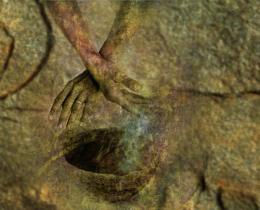Among all the suppressed emotions Radical Remission survivors talk to me about releasing, fear is by far one of the most common discussed. Perhaps this is because fear is something we all have felt to some degree, whereas not everyone can relate to, for example, intensely held grief or resentment. The fear of death, in particular, is something we all must face at some point in our lives, and cancer patients are forced to face it the moment they hear the words, “You have cancer.”
Because fear is such a dominant emotion for most cancer patients, many of the healers I study believe it is the first thing that needs to be addressed. One of those healers is Patti Conklin, PhD. Patti is a “medical intuitive,” which means that she apparently has the clairvoyant ability to know where, how, and why a person is sick simply by looking at that person and reading his or her energy field. She explained to me that she was born with a different kind of eyesight from most people, with the ability to view people’s energy fields as one would view a TV screen of static. During our interview, I asked Patti what she thinks a cancer patient should do to begin the healing process, and she replied:
Surrender. The goal is to get the physical body, the emotional body, and the spiritual body back into alignment, back into balance. There’s love and fear. And people look at fear as False Evidence Appearing Real. I look at it as Forgetting Every Available Resource. And that resource is what we have inside of us. I encourage my patients to surrender, to be at peace with dying and be at peace with living. And the more that you can bring the body into neutrality, the greater chance you’ll have of healing....But if people are in fear, then the whole energy field, the subtle energy fields, the immune system—it all shuts down.
In other words, Dr. Conklin believes that releasing fear and sinking into that inherently available “resource” of internal peace can help bring the body back into balance, whereas holding on to fear can cause the body’s systems to shut down, thereby creating an energetic blockage that can eventually lead to physical disease. However, truly surrendering in the way Dr. Conklin advises involves looking at one’s fear of death head-on, and that is not always an easy thing to do.
Facing Fear When "Nothing Works"
For instance, “Nathan” was forced to face his own fear of death when he decided to stop chemotherapy and instead pursue alternative medicine treatments. He was originally diagnosed with stage 4 lymphoplasmacytic lymphoma, an incredibly rare and hard-to-treat form of lymphoma. Conventional medical doctors know very little about this type of cancer, so when a few rounds of chemotherapy made Nathan’s cancer grow dramatically, he decided to stop. He parted ways with his conventional doctors shortly thereafter, and they regretfully informed him that he had only one to two years to live. Since then, Nathan has embarked on a healing journey that has included energy treatments from various healers, mistletoe herbal supplements, and a commitment to release all trauma from his past and all fear from his present. He describes what it was like to face his fear of death:
When I decided that I would stop [the chemotherapy], the fear really hit me hard—worse than before, because I really knew that this decision involved that I might die in the next year.…And there were about four days when I didn’t sleep. I couldn’t sleep at night when I went through this process of facing this fear and accepting that I was going to die. But after that, it was gone! The fear of death was gone. And once you make those decisions, once you jump into trust, things just happen, you know? Two days later, I just “happened” to meet [a famous healer].
Nathan’s doctors gave him one to two years to live back in 2005. When I interviewed him in 2011, he was enjoying traveling in South America, soaking up all its natural beauty. I fully realize that facing one’s fear of death can range from being quite easy to tremendously difficult, depending on your beliefs about what happens after you die. However, almost all the Radical Remission survivors I study say that facing that fear directly—at least for a short while—gave them some degree of relief, because they were no longer ignoring the elephant in the room.
Studies Show the Power of Emotions
To give you an example of how much power fear has over the physical body, consider this study, in which the researchers were not intending to study fear at all. Instead, they were trying to figure out whether or not a new type of chemotherapy worked. They separated cancer patients into two randomized groups: the first group received the new chemotherapy, while a second, control group thought they were getting the new chemotherapy but were only getting saline infusions. Amazingly, 30 percent—forty people—in the control group lost all their hair, simply because they thought they were receiving chemotherapy. In other words, their intense fear of having a side effect caused their bodies to produce the side effect, even though they weren’t actually getting any chemotherapy.
In countless other studies researchers have shown that fear keeps the body stuck in fight-or-flight mode, which means the body cannot switch over to rest-and-repair mode. Many people don’t realize that these two modes of operating are mutually exclusive; so, if you are feeling fear, your body is not healing, and if your body is self-healing, you are not feeling fear. For example, in one study people who tended to be fearful to begin with did not produce any natural killer cells after being exposed to a stressor, while people who were by nature not as fearful did produce them. That is why so many radical survivors repeatedly tell me that releasing fear from the body is one of the absolute best things you can do to help your body heal, because fear literally shuts down the immune system.



